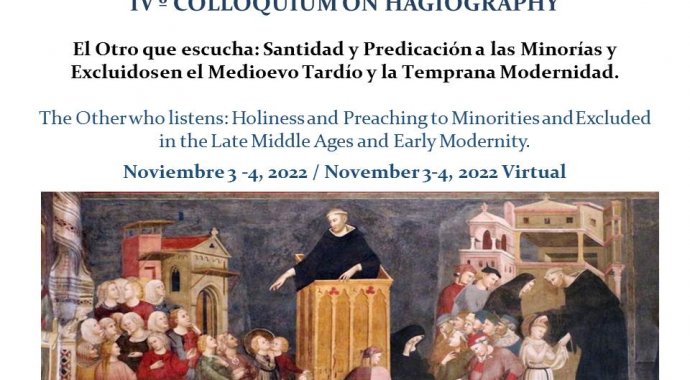
Local:
Data início:
Data fim:
Horário:
Organização:
Grupo de Investigação Associado
Tipo de Evento:
IV Colloquium on Hagiography | The Other who listens: Holiness and Preaching to Minorities and Excluded in the Late Middle Ages and Early Modernity
On November 3rd & 4th will be held online the IV Colloquium on Hagiography| The Other who listens: Holiness and Preaching to Minorities and Excluded in the Late Middle Ages and Early Modernity.
It is the purpose of this IVth Colloquium on Hagiography, convened by the Augustinian Library in Buenos Aires, to be able to reflect on the research in the hagiographic field referring to Saints, Blesseds and venerable ones who have given their testimony of holiness in the midst of the Blessed of the Gospel (Cf. Mt V, 3-12).
Discourses on poverty, minorities and the exclusion of these for various reasons related to religion, gender, ethnic origin, health and life decisions, are highly cultivated nowadays. Following a path of scientific production that began a couple of decades ago, studies related to the social field, cultures, practices of writing and reading, ways of preaching, the practice of power and the hagiographic models, continue to enjoy a vitality from different disciplines, which contribute to the debate and generate the challenge of also providing a living contribution and an analysis of what is happening to us in the present as a society from the academic field.
For this, we invite researchers with work in progress who want to share their contributions from their disciplinary or confessional approaches, within the time frame of the call (From Early Christianity to the 18th century), with special emphasis on those witnesses of the Christian faith. who have been in contact with Judaizing minorities, Moors, excluded for reasons of origin, ethnicity or race, slaves, poor, migrants, etc. Likewise, the modern period includes the possibility of also analyzing the relationship between preaching and holiness with the original cultures of the New World as it was called at that time. In turn, the approach used may include any of the three main aspects of the act of preaching: the preacher as the transmitter of the message, the sermon as an instrumental, documentary and textual reflection of that act, and the audience as the objective, receiver and interpreter of the message. speech.
+Info:bibcisao@gmail.com bibliothecaugustiniana@gmail.com& biblioteca@sanagustin.org
